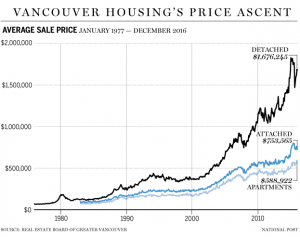Blog #3 What is next for the Vancouver Real estate market?
Being the world’s 3rd best city to live in, Vancouver, an economic hub contributing highly to the overall Canadian economy, is under a real estate crisis as the housing bubble steps closer to a ‘pop’. For the past years, the cost of purchasing a house in Vancouver has been flying high above the Burj Khalifa, with the bench mark housing price reaching C$ 1.4 million.
Having come across a Guardian article discussing the real estate market in this city, I was appalled and intrigued by the fact that foreign investment, mainly flood of Chinese buyers in the market was a factor.
 Historical prices of Vancouver houses (1980-2016)
Historical prices of Vancouver houses (1980-2016)
Having settled in Vancouver for a month, I realized the flood of Chinese millionaires purchasing houses in Vancouver is nothing new for locals. The real issue is, millionaires shipping their earnings from China to Vancouver and investing this capital into Real Estate, with no contribution to the economy. I believe, if there were any contribution, i.e. starting businesses or getting employed, would allow payment of taxes via Chinese, and hence a contribution to the economy. This would cause an increase in tax revenues for the BC, which could be used to fund affordable housing schemes for the locals.
In early 2017, a 15% mandatory foreign property tax was imposed in the BC mainly to restrict foreign buyers from purchasing houses in Vancouver, but there are many loop holes around it. 1) Canada’s investment program allows foreigners to purchase a house for a minimum of C$ 800,000 and become a Canadian national, allowing the 15% tax to be avoided. 2) If you look at it from a cost perspective, for millionaires 15% additional tax would be an insignificant amount. Assuming a house for C$1 million, an additional 15% tax would cost an additional C$150,000: minimal for a millionaire. Hence, I believe this regulation introduced will be ineffective in the market.
Moreover, the real issue behind the housing crisis is the possible threat on the growth of future businesses in Vancouver. Individuals will be unwilling to work for companies, due to housing becoming unaffordable for many to settle and grow their families. Companies thus, risk failure due to the inability to attract prospective employees; they have to possibly imply an increase in salaries, in order to retain present employees, who are expected to add value to the company and move up the organization hierarchy.
The local government must certainly introduce further regulations, in order to address the issue of housing affordability for locals who plan to work in Vancouver, contributing to the BC’s economy via taxes. Further taxation on foreign buyers is a way to retain talented employees, avoiding businesses to move out due to lack of talent available in the city.
Word count: 450
Sources used:
https://www.theguardian.com/cities/2016/jul/07/vancouver-chinese-city-racism-meets-real-estate-british-columbia
https://www2.gov.bc.ca/gov/content/taxes/property-taxes/property-transfer-tax/understand/additional-property-transfer-tax
http://www.cic.gc.ca/english/immigrate/business/investors/index.asp
http://dailyhive.com/vancouver/most-livable-city
http:// business.financialpost.com/personal-finance/mortgages-real-estate/portrait-of-a-cooling-housing-market-vancouver-home-sales-fall-5-6-in-2016